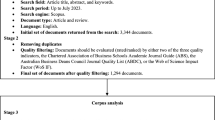Abstract
Whether or not intrinsic valueis additively measurable is often thought todepend on the truth or falsity of G. E. Moore'sprinciple of organic unities. I argue that thetruth of this principle is, contrary to received opinion, compatible with additivemeasurement. However, there are other veryplausible evaluative claims that are moredifficult to combine with the additivity ofintrinsic value. A plausible theory of the goodshould allow that there are certain kinds ofstates of affairs whose intrinsic value cannotbe outweighed by any number of states ofcertain other, less valuable, kinds. Such``non-trade-off'' cannot reasonably be explainedin terms of organic unities, and it can bereconciled with the additivity thesis only ifwe are prepared to give up some traditionalclaims about the nature of intrinsic value.
Similar content being viewed by others
Author information
Authors and Affiliations
Rights and permissions
About this article
Cite this article
Carlson, E. Organic Unities, Non-Trade-Off, and the Additivity of Intrinsic Value. The Journal of Ethics 5, 335–360 (2001). https://doi.org/10.1023/A:1013962220004
Issue Date:
DOI: https://doi.org/10.1023/A:1013962220004




